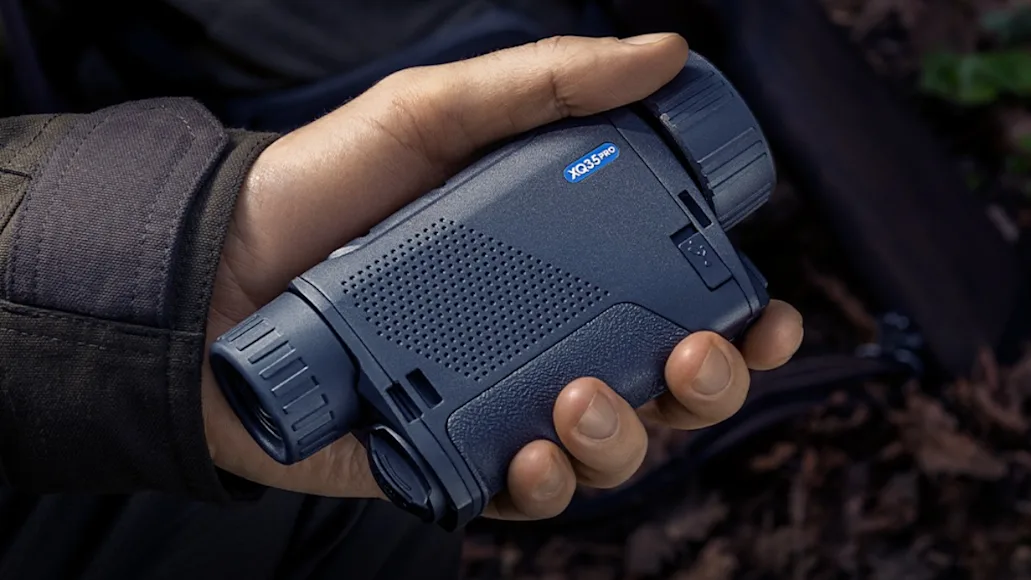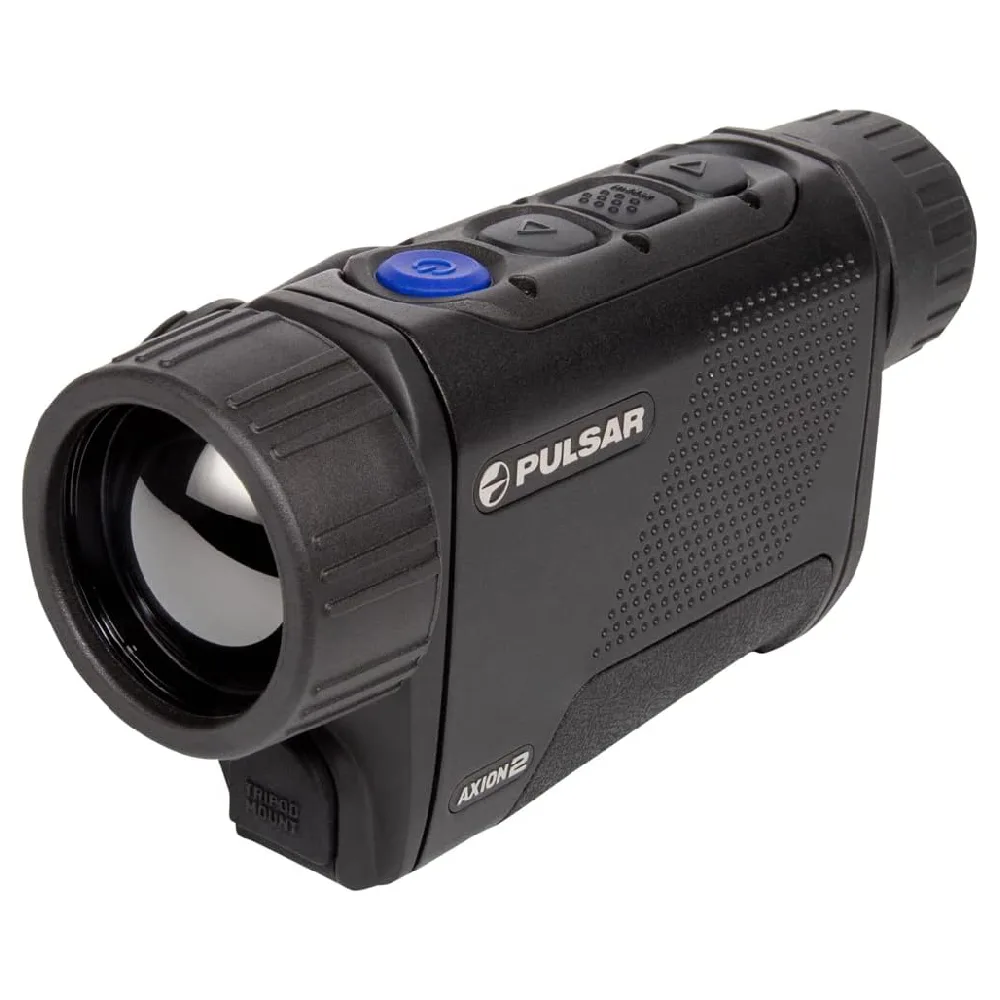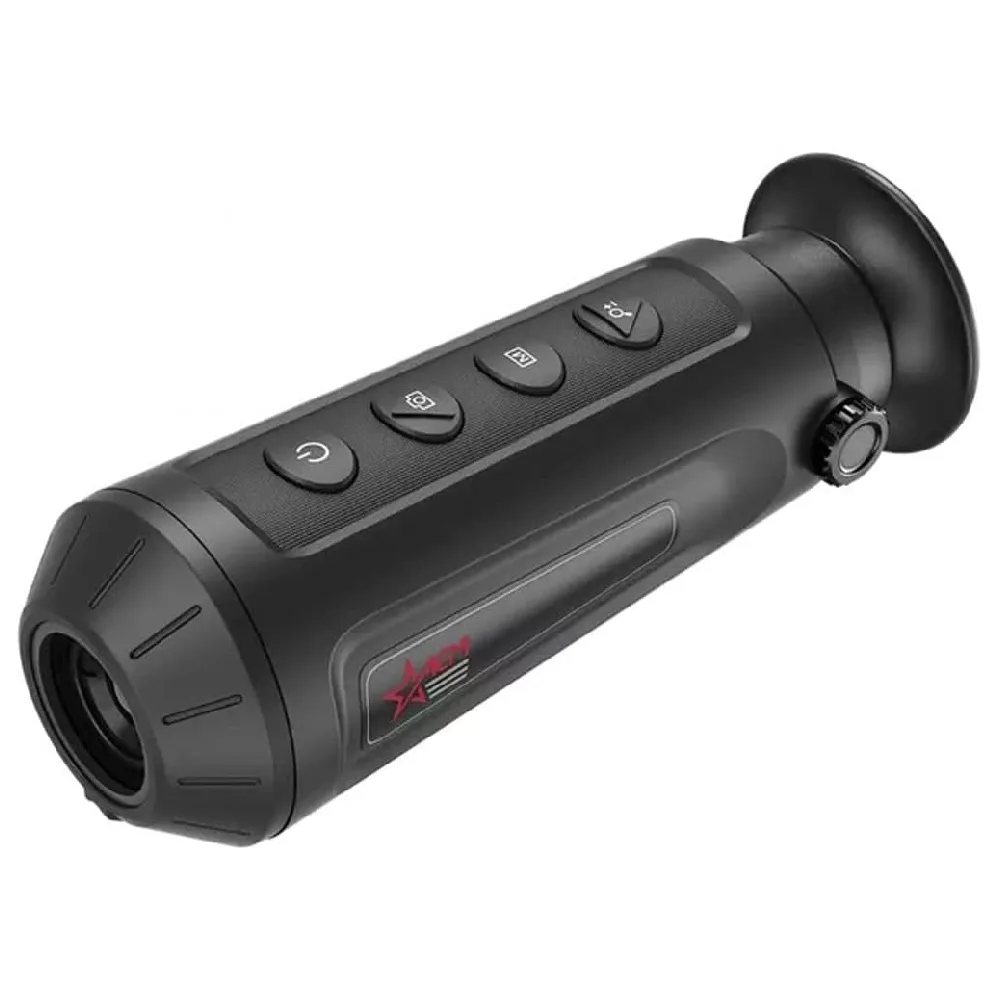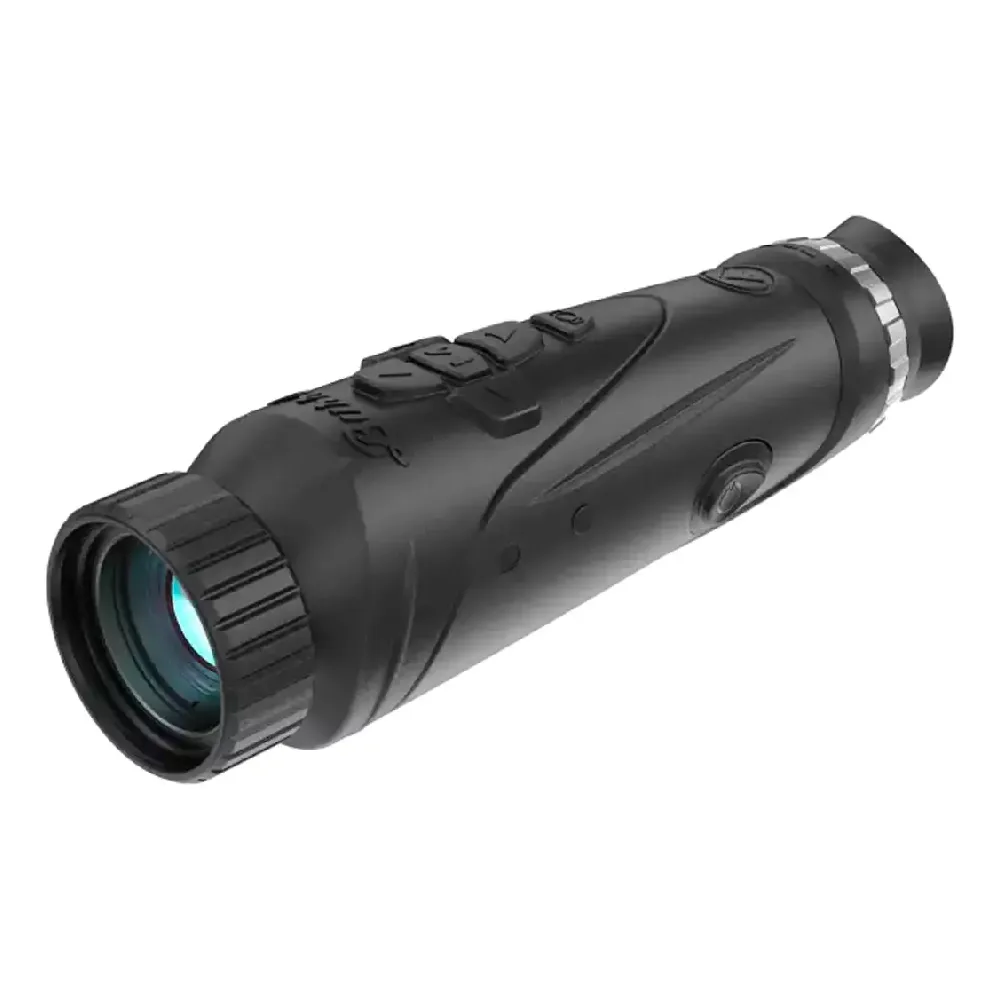We may earn revenue from the products available on this page and participate in affiliate programs. Learn more ›
There are a lot of affordable optics out there, but it takes an investment for a good thermal monocular. With spectacular advances in thermal technology over the last few years, these remarkable devices have become indispensable tools in the outdoors—especially for predator hunting, like hogs and coyotes. Along with the capabilities of a standard monocular, thermal monoculars have the ability to detect heat signatures and provide a clear real-time view of the world in complete darkness.
Whether you’re a wildlife enthusiast, a hunter tracking elusive game, or a first responder, a thermal monocular can be a game-changer in the field. Below, we researched and reviewed the top options available from optic brands like Pulsar and AGM to help you choose one of the best thermal monoculars to suit your specific needs and preferences.
Best Overall: Pulsar Axion 2 XG35
Best for Hunting: Burris Thermal Handheld
Best Premium: Pulsar Telos LRF XP50
Best Compact: ATN BlazeTrek 325
Best Budget: AGM Taipan TM15-256
Best Overall: Pulsar Axion 2 XG35
Specs
Resolution: 384×288 pixels
Refresh Rate: 50 Hz
Detection Range: Up to 1,750 meters
Magnification: 2.5 - 20 (x8 zoom)
Battery Life: Up to 11 hours
Pros
High-resolution thermal imaging with a crystal-clear 384×288 pixel display
Built-in rangefinder
Quick 50 Hz refresh rate smooth and responsive.
Durable construction with IPX7 waterproof rating
Built-in photo and video recording capabilities
Long battery life
Cons
Premium quality is reflected in its price, making it a higher-end investment compared to entry-level models
The Pulsar Axion 2 XG35 thermal monocular sets a standard in the thermal imaging world, earning its place as our best overall choice. With a high-resolution display at 384×288 pixels, it delivers crystal-clear thermal imagery that’s hard to beat. One of its standout features is the impressive detection range of up to 1,400 yards, which allows you to use it for a wide range of applications. Its versatile 8x zoom magnification option also accommodates various scenarios and target sizes.
This Pulsar thermal monocular doesn’t just offer exceptional image quality; it also comes with a built-in photo and video recording capabilities, allowing you to capture crucial moments and evidence. The Wi-Fi connectivity and smartphone app enhance the overall experience, enabling you to share images and control the monocular remotely.
Along with its powerful capabilities, the Axion 2 XG35 is compact and ergonomically designed, ensuring comfortable handheld use even during extended periods. It’s very durable thanks to its IPX7 rating that makes it both dust- and water-resistant. You can confidently use it in any weather conditions. While this thermal is more expensive than others on our list, it’s a worthwhile investment for those who demand top-tier thermal imaging performance.
Best for Hunting: Burris Thermal Handheld
Specs
Resolution: 206×156 pixels
Refresh Rate: 30 Hz
Detection Range: Up to 700 yards
Magnification: 2x – 8x
Battery Life: Up to 5 hours
Pros
Excellent detection range of up to 700 yards
Versatile magnification options for a range of hunting scenarios
Durable and ergonomic design, suitable for extended use in the field
Image and video recording capabilities
Cons
Slightly lower refresh rate (30 Hz) compared to some premium models
The Burris Thermal Handheld has firmly established itself as a top choice for hunting enthusiasts seeking a reliable thermal monocular. With a resolution of 206×156 pixels, it delivers high-quality thermal imaging, allowing hunters to detect game and track targets with clarity and precision. Its impressive detection range of up to 700 yards ensures you have a clear view even at extended distances.
The device’s versatile 2-8x magnification options make it adaptable to various hunting scenarios, from tracking elusive game to scanning the field. Its durable and ergonomic design is well-suited for extended use in the field, and the built-in photo and video recording capabilities let you capture those memorable hunting moments. Though it offers a slightly lower refresh rate than some premium models, the multiple color palettes and advanced image processing ensure customizable and enhanced viewing.
It’s heavier than some competitors but its compact portable design and high-resolution thermal imaging make up for the weight.
Best Premium: Pulsar Telos LRF XP50
Specs
Resolution: 1024x768
Detection Range: 1,800 meters
Magnification: 2.5-10 (x4 zoom)
Battery Life: 8.5 hours
Pros
Built-in video recorder
Easy-to-operate WiFi integration
High-contrast AMOLED display
Operational in extreme temperatures
Crystal clear images
Cons
More expensive—definitely an investment and not a budget buy
I hunted on the Sellmark ranch last fall and was able to test several of Pulsar's amazing thermals. The Pulsar Telos LRF XP50 is a top-tier thermal monocular that stands out for its high-performance specs and features, making it a solid investment for anyone serious about buying a thermal. You literally have eyes into the night and the Telos has an unbelievably crisp picture. It was neat to sit and watch the wildlife undetected, whether it was hogs at the feeder or just an armadillo scurrying through the field. I could see everything from yards away.

With a sharp 1024x768 resolution, a detection range of up to 1,800 meters, and a magnification range of 2.5-10x (with a x4 zoom), this device delivers exceptional clarity. The high-contrast AMOLED display ensures vivid images, while the fast aperture allows for quick focusing in varying environments. Plus, with eight color palettes to choose from, you can tailor the display to suit your preference and conditions.
The last thing you want is to make an expensive investment and have to “baby it.” These monoculars were built for tough environments, being IPX7 submersion waterproof rated and able to handle extreme temperatures. We operated them in the Texas heat mid-August (upwards of 100 degrees Fahrenheit) and it was hot! A standout feature is its 64GB of internal memory, which, combined with a built-in video recorder and Stream Vision 2 WiFi integration, makes it a versatile tool for both recording and sharing your recordings. The battery life lasts up to 8.5 hours, giving you plenty of time for extended use. However, all these premium features come at a price, so while it’s not a budget option, the Pulsar Telos LRF XP50 is a serious piece of gear for those who want the best.
Best Compact: ATN BlazeTrek 325
Specs
Resolution: 800x600
Detection Range: 1,000 meters
Magnification: 2-16x
Battery Life: 8 hours
Pros
Video record and photo capture
Multiple color palettes
Advanced thermal sensor
Cons
Lower internal memory (16GB) than others we tested
The ATN BlazeTrek 325 is the perfect choice for those wanting a compact yet powerful handheld thermal monocular. It's a more affordable buy compared to some of the others we've reviewed. With an OLED 800x600 resolution and a detection range of up to 1,000 meters, it offers impressive clarity in a small, easy-to-carry package. The 2-16x magnification range provides great flexibility, allowing you to zoom in on distant targets with ease.
One of the standout features is its advanced thermal sensor, which ensures reliable performance in various conditions. It also comes equipped with video recording and photo capture capabilities, so you can document your observations on the go. Multiple color palettes allow for customization based on your environment. Battery life is a solid 8 hours. While it has less internal memory at 16GB compared to other models, it still offers enough space for most users.
Best Budget: AGM Taipan TM15-256
Specs
Resolution: 256x192 pixels
Refresh Rate: 25 Hz
Detection Range: Up to 710 meters
Magnification 1.5x – 12x
Battery Life: Up to 8 hours
Pros
More affordable
Compact and lightweight—ideal for handheld use without causing arm fatigue
Decent detection range of up to 400 meters
Multiple magnification options
Cons
Limited resolution compared to higher-end models
The AGM Taipan TM15-256 is a solid budget-friendly option in the world of thermal optics. While it may not boast the high-end specifications of its pricier counterparts, it offers impressive thermal imaging capabilities at a more budget-friendly price point. With a resolution of 256×192 pixels, it provides clear thermal imagery for various outdoor activities, including hunting and wildlife observation. The choice of magnification levels allows you to adapt to different scenarios and target sizes.

The compact and lightweight design makes it easy to pack in your bag without adding much weight, while its IP67 rating ensures it can withstand the elements, protecting against dust and other debris. The AGM thermal monocular may have some limitations—like shorter battery life and less advanced features—but if you’re seeking an entry-level thermal optic that doesn’t break the bank, we highly recommend it.
How We Tested Thermal Monoculars
When you’re investing in a thermal monocular, you need to know what you are getting. There are a wide range of capabilities and price points. Think about your intended use. Whether it’s for hunting, wildlife observation, security, or search and rescue, your requirements may vary, and different models are optimized for different applications. There are several key factors to consider, ensuring you make the right choice for your specific needs:
Resolution: Look for a monocular with a higher resolution, as it will provide crisper and more detailed images. A higher resolution is particularly crucial if you plan to identify smaller objects or targets at longer distances.
Detection Range: Different thermal monoculars have varying detection ranges. Consider the distance at which you need to detect and identify objects. A longer detection range is essential for hunting, security, or surveillance.
Price: Thermal monoculars can vary significantly in price. Set a budget and find a model that meets your needs within that range. Keep in mind that more expensive models often come with more advanced features and better performance.
Refresh Rate: The refresh rate, measured in hertz (Hz), determines how smoothly the image is displayed. A higher refresh rate, such as 50 Hz or 60 Hz, is crucial for fast-moving subjects or when panning quickly.
What To Look for in a Thermal Monocular
Resolution
Thermal monoculars come in various resolutions, typically measured in pixels. Higher resolution provides sharper and more detailed images. Consider your intended use, as higher resolutions are also essential for long-range observation and precision applications.
Battery Life and Durability
Check the monocular’s battery life, especially if you plan to use it for extended periods. Some models offer interchangeable batteries for convenience. Additionally, assess the monocular’s build quality and durability. It should be able to withstand various weather conditions, including rain and extreme temperatures if you plan to use it in harsh environments.
Recording and Connectivity
If you want to record thermal footage or stream it to a display or mobile device, make sure the monocular offers these features. Some models even have built-in Wi-Fi or Bluetooth capabilities.
FAQs
Q: What is a thermal monocular?
A thermal monocular is a handheld, portable device equipped with thermal imaging technology that allows you to detect and visualize heat or infrared radiation. Unlike traditional night vision devices that rely on ambient light or image intensification, thermal monoculars can create images in complete darkness or through obstacles such as smoke, fog, or foliage. These devices work by detecting variations in temperature and displaying them as high-contrast images, with warmer objects appearing brighter and cooler objects darker.
Q: Can you use a thermal monocular with a scope?
Yes, thermal monoculars can often be used in conjunction with rifle scopes for enhanced targeting and observation capabilities. This combination is commonly referred to as a “clip-on thermal scope” or “thermal clip-on.”
Q: Can a thermal monocular be used in daylight?
Yes, you can use a thermal monocular in daylight. Unlike night vision devices, which rely on ambient light, thermal monoculars create images based on heat signatures. They detect temperature differences, making them effective in a wide range of lighting conditions, including broad daylight.
Final Thoughts
When selecting the best thermal monocular for your specific requirements, it’s essential to consider factors such as resolution, detection range, magnification, battery life, durability, and user-friendliness. Brands like Pulsar, AGM, and Burris offer a range of models, each with unique strengths tailored to various applications. Remember to strike a balance between your budget and the features you need. With the right thermal monocular in hand, you’ll unlock a new dimension of vision and gain the upper hand in activities as you explore the world—and the wilderness—through the lens of thermal imaging.
Why Trust Us
For more than 125 years, Field & Stream has been providing readers with honest and authentic coverage of outdoor gear. Our writers and editors eat, sleep, and breathe the outdoors, and that passion comes through in our product reviews. You can count on F&S to keep you up to date on the best new gear. And when we write about a product—whether it’s a bass lure or a backpack—we cover the good and the bad, so you know exactly what to expect before you decide to make a purchase.







